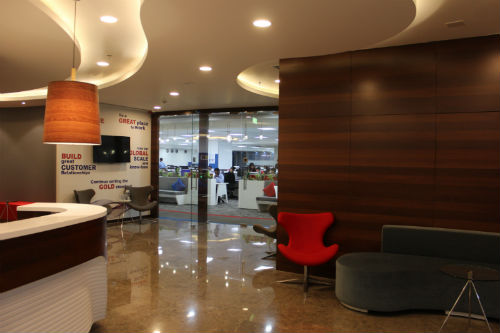

Who We Are
Travelex India was conceptualised and formed in 2002 with an initial headcount of 35 employees. At this time, the centre was largely an extension of the Travelex IT teams globally. In 2012, Travelex India expanded its operations, and the decision to ramp up the centre from 35 to 265 colleagues was taken for transitioning additional work. In 2013, HR Global Shared Services was also launched and this was soon followed by Finance and Compliance & Risk Global Shared Services, taking the headcount to 350.
Today, Travelex India is focused on delivering efficiencies across a shared services model. Comprising close to 600 employees, the centre provides business support to various Travelex entities worldwide in the fields of Information Technology, Human Resources, Finance, Compliance and Risk Management. 2016 onwards, Travelex India has been focused on driving improvements around efficiency, effectiveness and control, while delivering strategic value across Travelex Group.
Mumbai Leadership Team


Global Operations
Global Operations is intended to be an integrated, innovative and efficient services capability for the business. This is being realised through a shared services model across Human Resources, Finance, Legal, Compliance & Risk and Process Engineering functions. We collaborate with diverse sets of teams across projects and geographies, with the sole purpose of better serving our customers. In a sense, we take pride in putting our internal and external customers at the heart of everything we do!
We provide back-office support services for all processes, sub processes, transactions, activities and all other work performed by Travelex group companies globally. This includes those process or sub processes that are related to
- Financial accounting and reporting
- Compliance and risk assessment
- Human resource activities
- Legal expertise and company secretarial services
- Process excellence through re-engineering
Be it transactional or analytical, and whether it involves cost reduction and containment, reporting, systems implementation or procedural development, our aim is to ensure that we effectively partner with the business and contribute to its strategic priorities.
And more than just efficiency, we are about Operational Innovation, inventing and deploying new ways of working. Re-thinking how we can better operate in our industry, the teams work round-the-clock to ensure that every facet of the business is strengthened by bridging those gaps and embracing innovative approaches in addressing the issues at hand.
As of October 2018, Global Operations comprises of 260+ full time employees.

Information Technology
Our vision here in Global IT is to be the provider of IT Services and Products that Travelex would choose if they had the option to go elsewhere. By developing our people, our expertise and our brand we are here to guide the business in making the right choices, at the right cost and at the right time to enable Travelex to meet its goals. In our pursuit of excellence, we encourage ownership and accountability to get the job done, thereby instilling a sense of pride with the contribution each person has made.
Technology is a driving force behind much of the business transformation currently underway at Travelex. These are exciting times as we work on balancing existing and future needs – for employees, customers and our partners. Key words in Travelex are innovation, automation and digitisation – they drive our focus and behaviour. As opportunities are considered, new products developed, new markets explored and new clients knock on our door, it’s vital that we how we can do things smarter and more efficiently. We always want to hear about better ways of doing things.
We are advocates of SAFe (Scaled Agile Framework) which is supporting our Scrum and DevOps Model. This is helping us change the way we develop software and add value. It also champions new ways of thinking and working and supports our sharp focus to deliver value and continuous improvement. The need to work with agility is recognised and appreciated by our business partners and enables us to deliver incremental functionality and robust solutions.
Our business colleagues look to us to deliver prompt, reliable service – around the globe and around the clock.
Our cloud first strategy is transforming our legacy environment over the coming months and years. Cloud Engineers will be vital to support this growing part of our business. This transformation to cloud will ensure standardised systems that improve our operational efficiency and reduce risk. In so doing, we are aligning ourselves to industry best practices. It is a huge transition that is complex, challenging and revolutionary for Travelex.
In terms of our Global Technology Team, our largest presence is based in Travelex India with the full range of expertise present -
Technology Solutions, Scrum Masters, Project and Portfolio Management, Developers and Testers, Engineers, DevOps Teams, Application Support, Service Desk colleagues, Infrastructure and End User Computing Specialists – all roles are found within our team on site.
Great team collaboration is needed whilst being mindful of the customer and employee experience and the importance of delivering a quality result, tracking the time to market and the value of consultation with the business and keeping them informed. Our days, customers, locations, products and systems all bring diversity and challenge to our roles, giving us the chance to demonstrate what each one of us does best.
Corporate Social Responsibility (CSR) Policy for Travelex India Private Limited
In accordance with Section 135 of the Companies Act, 2013 and the rules promulgated thereunder (collectively, the “CSR Requirements”), the Board of Directors (the “Board”) of Travelex India Private Limited (the “Company”) has adopted this Corporate Social Responsibility Policy (the “CSR Policy”).
CSR Committee
The Company’s CSR Committee consists of the following Directors:-
1. Ms. Victoria Benis-Lonsdale
2. Ms. Shabnam Khan
CSR Activity
The Company shall undertake specific corporate social responsibility (“CSR”) projects and programmes, within the CSR categories as listed in the Annexure to this CSR Policy.
All CSR projects and programmes shall be carried out only in India. No specific CSR projects or programmes shall be undertaken in pursuance of normal course of business of the Company.
In furtherance of specific CSR projects or programmes, the Company may collaborate with NGOs and other like-minded stakeholders, including other companies, registered trusts and societies. Set forth on the Annexure to this CSR Policy are the specific projects and programmes approved by the Board.
CSR Spend
The Company shall seek to spend annually 2% of the average net profits of the Company, made during the three immediately preceding financial years, on specific CSR projects and programmes.
Administration
The Company’s CSR projects and programmes shall be overseen by a separately designated CSR committee of the Board, consisting of at least 3 Directors (hereinafter, the “Committee”).
Monitoring
Under the direction of the Committee, the Company shall implement a monitoring mechanism over the Company’s CSR projects and programmes. Such monitoring mechanism shall, among other things, make transparent the manner and details of the implementation of all CSR projects and programmes undertaken by the Company.
The Board shall receive reports twice a year, from the Committee on the status of the Company’s implementation of specific CSR projects and programmes.
On an annual basis, the Board shall report to relevant stakeholders on the Company’s CSR projects and programmes and related matters, as required by CSR Requirements.
Amendments to CSR Policy
The Committee shall review this CSR Policy on a periodic basis and shall update it as necessary or appropriate (subject to approval by the Board, if applicable) to ensure that it reflects CSR Requirements as well as the current interests of the Company and relevant stakeholders.
Appendix
Activities relating to:-
1. eradicating hunger, poverty and malnutrition, promoting preventive health care and sanitation including contribution to the Swach Bharat Kosh set-up by the Central Government for the promotion of sanitation and making available safe drinking water;
2. promoting education, including special education and employment enhancing vocation skills especially among children, women, elderly, and the differently abled and livelihood enhancement projects;
3. promoting gender equality, empowering women, setting up homes and hostels for women and orphans; setting up old age homes, day care centres and such other facilities for senior citizens and measures for reducing inequalities faced by socially and economically backward groups;
4. ensuring environmental sustainability, ecological balance, protection of flora and fauna, animal welfare, agroforestry, conservation of natural resources and maintaining quality of soil, air and water including contribution to the Clean Ganga Fund set-up by the Central Government for rejuvenation of river Ganga;
5. protection of national heritage, art and culture including restoration of buildings and sites of historical importance and works of art; setting up public libraries; promotion and development of traditional arts and handicrafts;
6. measures for the benefit of armed forces veterans, war widows and their dependents; Central Armed Police Forces (CAPF) and Central Para Military Forces (CPMF) veterans, and their dependents including widows;
7. training to promote rural sports, nationally recognised sports, paralympic sports and Olympic sports;
8. contribution to the Prime Minister's National Relief Fund or Prime Minister's Central Assistance and Relief in Emergency Situations Fund (PM CARES Fund) or any other fund set up by the Central Government for socio-economic development and relief and welfare of the Scheduled Caste, the Scheduled Tribes, other backward classes, minorities and women;
9. (a) Contribution to incubators or research and development projects in the field of science, technology, engineering and medicine, funded by the Central Government or State Government or Public Sector Undertaking or any agency of the Central Government or State Government; and
(b) Contributions to public funded Universities; Indian Institute of Technology (IITs); National Laboratories and autonomous bodies established under Department of Atomic Energy (DAE); Department of Biotechnology (DBT); Department of Science and Technology (DST); Department of Pharmaceuticals; Ministry of Ayurveda, Yoga and Naturopathy, Unani, Siddha and Homoeopathy (AYUSH); Ministry of Electronics and Information Technology and other bodies, namely Defense Research and Development Organisation (DRDO); Indian Council of Agricultural Research (ICAR); Indian Council of Medical Research (ICMR) and Council of Scientific and Industrial Research (CSIR), engaged in conducting research in science, technology, engineering and medicine aimed at promoting Sustainable Development Goals (SDGs).
10. rural development projects;
11. slum area development.
12. disaster management, including relief, rehabilitation and reconstruction activities.
Note: The above activities may be interpreted liberally so as to capture the essence of the subjects enumerated above.